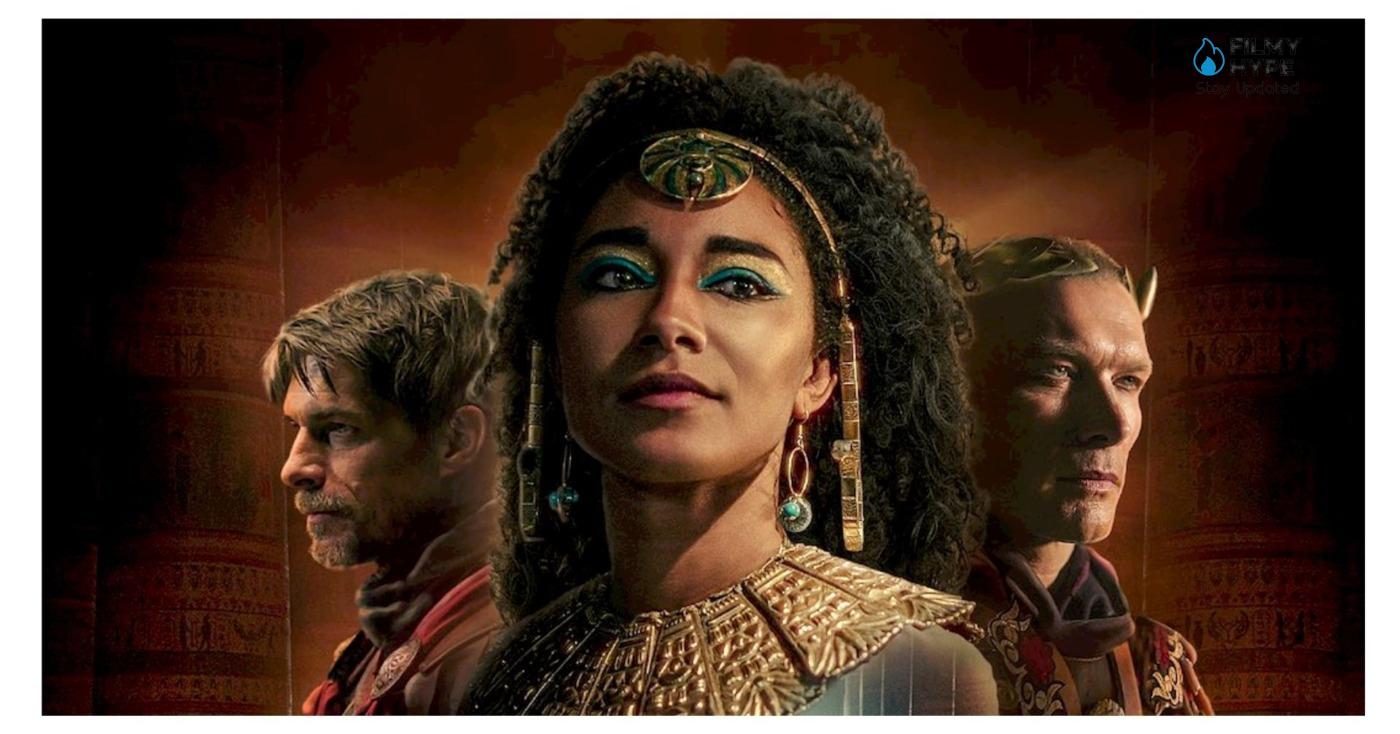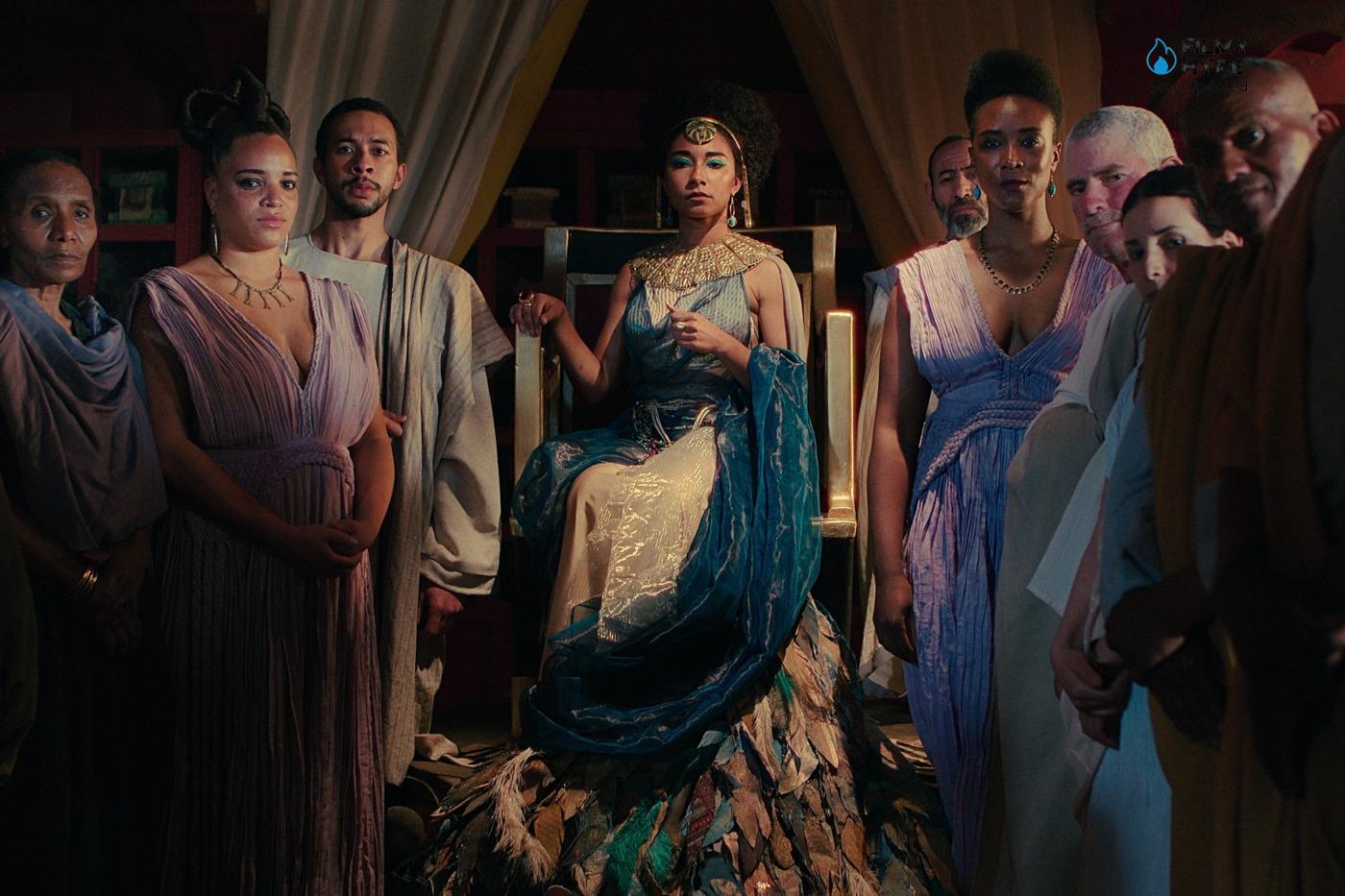Queen Cleopatra Review: A Classic and Well Packaged Docu-Series | Netflix Series
Cast: Adele James, Craig Russell, Nada El Belkasmi
Creator: Tina Gharavi
Streaming Platform: Netflix
Filmyhype.com Ratings: 3/5 (three stars)
The curiosity that revolves around Queen Cleopatra, the new Netflix docudrama arriving on May 10th and produced by Jada Pinkett Smith, is far too high. There are many reasons, and not all derive from the historical fascination that the last Hellenic queen still exercises today, but from the controversies that have invested in its production since the diffusion of the official poster. Which have even moved the Supreme Council of Egyptian Antiquities, on whose work they have poured accusations of blackwashing and false history. Already the subject of controversy weeks before its release. An operation that not only presents us, as is now known, a black Queen Cleopatra but also attempts to update and update (perhaps too much) one of the most famous and iconic figures in history. Produced and narrated by Jada Pinkett-Smih, the series, without deviating too much from the classic television docu-fiction, thus renounces a purely popular approach to support an unusual thesis and an alternative point of view.

The first of a series of documentaries dedicated to legendary African sovereigns, Queen Cleopatra and her four episodes directed by Tina Gharavi, between interventions by scholars and parts of fiction (with the protagonist played by Adele James), tells the most salient facts of the life of last sovereign of Egypt in a story that, between palace intrigues, loves and wars, deliberately seems to look more to Game Of Thrones than to a historical documentary. An attempt that goes well with Netflix’s average offer but, perhaps for this very reason, betrays a certain superficiality and a certain basic schematism. An undoubtedly profitable move on a commercial level, since the first season of African Queens, dedicated to the history of Queen Njinga, unfortunately failed to leave its mark on the general public. But beyond the production’s cunning marketing strategies and heated debate over “blackwashing,” what’re these infamous docuseries like?
Queen Cleopatra Review: The Story Plot
51 BC Queen Cleopatra, after the death of her father, ascends the throne together with her brother Ptolemy. She is an intelligent woman, devoted to study and, unusual for members of her dynasty, close to ancient Egyptian traditions, perhaps the legacy of an indigenous mother whose identity is unknown. Soon her internal quarrels forced her into exile in Syria but, in the war that followed, she would definitively regain power, thanks above all to the help of Julius Caesar (John Partridge). Hence, in rapid succession, the birth of her son Caesarion, her rivalry with her sister, and her trip to Rome. In the Republican capital, however, Queen Cleopatra will learn the hard way that a woman with so much power is never welcome. But she will still manage to carve out an important role alongside Cesare, at least until he is assassinated. Then the return to Egypt, civil war, and a new lover and ally, the last: Mark Antony (Craig Russell). It will be the war against the future Emperor Octavian (James Marlowe) that will seal the fate of the last sovereign of Egypt, determined until the end to prevent her country from becoming a colony of Rome.
However, the fate of history was changed forever by the arrival in Egypt of the Roman general Pompey, who was beheaded by Ptolemy’s advisers in a futile attempt to curry favor with his rival Caesar. The ploy fails miserably, and Queen Cleopatra finds herself forced to negotiate with Caesar and convince him not to rage against Egypt for this tragic mistake, leading him to grant favorable economic conditions to the indebted Nile valley. Ptolemy XIII, however, still challenges the power of Rome and gives rise to the famous Alexandrian war, during which a fire devours the famous library of the city: a year later, Queen Cleopatra will conceive a son by Caesar, and will begin to cultivate the dream of uniting the fortunes of Egypt and Rome. The assassination of the Ides of March and the rise of Antony and Octavian, however, will abruptly change the cards on the table, and will force Queen Cleopatra to make increasingly difficult choices to protect her kingdom from the threat of annihilation…
Queen Cleopatra Review and Analysis
The figure of Queen Cleopatra, the pure incarnation of the goddess Isis, has been represented on the screen many fewer times than one might believe. In the common cinematographic imagination, the Queen of Egypt has the face of Elizabeth Taylor who, for the African people, seen as things stand, remains perhaps the most authentic transposition of her. Even in the most recent docuseries The Roman Empire: Power and Blood, Jessica Green comes very close, on an aesthetic level, to the idea that some scholars (and Egyptians of course!) have of Queen Cleopatra and her complexion. Jada Pinkett Smith however, wanted to change the cards on the table and enliven souls, and to do so he chose a black woman, bringing Egyptologists, authors, and historians into his docuseries who could provide elucidation about his ethnicity. Queen Cleopatra was descended from the Ptolemies, Hellenes… Greeks.
And this is a fact. But no document or historical artifact has been able to trace the identity of the mother. She that consequently, she could be Egyptian and, as such, have a darker skin color. Queen Cleopatra opens with this explanation, to immediately get her hands on what she will then show. Lawful and passable, therefore, the actress Adele James. Having clarified the mystery, Queen Cleopatra traces the life of the Pharaoh (she will call herself that during her reign) in four blocks depicting different periods: the ascent to the throne, the conquest of Rome with Julius Caesar, love with Mark Antony and her struggle for Egypt cost her death.
By limiting the analysis of historical simplifications to the first episode – but the discussion also continues in the subsequent episodes! – The series presents us with a Queen Cleopatra genetically certain that Pompey should not be attacked and beheaded since he is still Caesar’s son-in-law. This is a position not confirmed by any ancient source since at that stage Queen Cleopatra was in exile: any opinion of hers on palace politics is the result of a pure conjecture of the authors! The eunuch Potino, adviser to Ptolemy XIII and “villain” of our very little documentary story instead promptly decides to make the wrong choice, despite, as the voice-over reiterates three times, Pompey is Caesar’s son-in-law! But was Pothinus really that stupid?
Of course, history proved him wrong and the Roman general was truly furious at the killing of his rival, but the eunuch’s political gamble had much more than one reason for existing: Caesar and Pompey had waged a war to the death, and it was more than plausible that the elimination of the rival represented a welcome favor, despite their old kinship ties. According to almost all historians, Caesar declared his intention to pardon Pompey only to gain the favor of Roman public opinion, and the anger displayed on his arrival in Egypt had nothing to do with their family bond. Lucan’s Pharsalia, even insinuates that Caesar would have had difficulty hiding his joy at the death of his rival, and he had to stage a mere farce because he was still facing his men. In short, the dilemma of Ptolemy’s advisers was certainly not that simple…

Although, therefore, deepening his personality is the main key to better understanding the historical figure, a special focus on what his legacy was would have given the product a more complete cut on the historical-popular front. Much is, as mentioned, hinted at, and some passages take up a little more space within the remake, but to summarise, some crucial points that dictated a change of course in Queen Cleopatra‘s life have been set aside. We are speaking, for example, of the threat from the courtiers, who wanted to weaken the recently ascended queen and remove her from Alexandria. Which happened then. Of the importance that the second triumvirate had, which was followed by the rapprochement with Marco Antonio.
Of the battles fought between Rome and Egypt. Not even the alliances made by Queen Cleopatra with Julius Caesar and, later, with Mark Antony are explored. The context, therefore, serves only as a background. The attention, in addition to the female Queen Cleopatra, is directed more to the romance part, which we understand is more appealing to the public, drawing its advantages on the commercial side. The flirtations that the sovereign had with the dictator and the Roman soldier are spread across all four episodes, becoming the focus of the entire docuseries. It is love that takes the reins of the story. A political love, well studied, in which there was the need to secure power and the continuation of the dynasty. To this overabundance of feeling (romancing the epic love story between Mark Antony and Queen Cleopatra was a clever move), a scarcity of warlike scenes runs parallel. The scenography is poor and there is little use of digital, hence the clashes (both by land and with naval fleets) unfortunately we have only a taste. But perhaps this is the price to pay for a not-exactly-high budget.
Yet Queen Cleopatra which, in conclusion, does not stand out in the list of the best-made Netflix docuseries, certainly cannot end negatively. Because she carries with her a beautiful message about women. In ancient Egypt, they could hold power, become queens, and be divinities. They could go to war, manage the finances of the people, and devise strategies. They were an active part of politics and of the entire economic system and this, precisely in the work, contrasts with the idea that the Romans had in the West instead. Who, for these reasons, pointed to Queen Cleopatra as a witch and manipulator, keeping her hatred based on the belief that the only place for women was within the four walls of the house. Mother and wife, nothing more. A misogynistic predisposition that pours into the figure of Octavian, the queen’s ultimate enemy, who precisely with her death (Queen Cleopatra‘s suicide is not a spoiler) confirms her position as a woman in power, who genuflects in front of no one. Who doesn’t let herself be commanded and chooses how and when to die? A beautiful parable, which makes Queen Cleopatra a modern woman, suitable for living today, reflects her emancipation and contemporary activist movements. And in which each one can be reflected. Could this be why Queen Cleopatra is called immortal? We believe so.
This is how the series demonstrates, on the one hand, the attempt to free Queen Cleopatra from the image of seductress and manipulator to which history has relegated her, restoring the weight, even political, of her role as woman and sovereign, on the other however, she proves too casual in making the character a proto-feminist icon, proudly linked to her Egyptian (and, therefore, African) roots and far from a white and patriarchal Western feeling. Yet, leaving out these elements, it cannot be said that Queen Cleopatra is a completely unsuccessful product. Among the “talking heads” of experts and re-enactments with a cinematic feel, the series enters fully into the classic historical-themed docufiction. Even its risky and “heretical” premise, which culturally appropriates the figure of Queen Cleopatra to promote a certainly forced but interestingly blackness of hers, goes well with the intent of the operation. If anything, the most relevant problem of the series was to condense the complexity, grandeur, and mystery of the sovereign in such a simplified figure and for the use and consumption of contemporary feeling. This is a problem that no blatantly political intent can solve.
Queen Cleopatra Review: The Last Words
Queen Cleopatra follows four periods in the life of the queen of Egypt, from her rise to power until her death. But if the intent seems to be to tell the impact that the last Hellenic sovereign had on a historical-political level at the time of the Roman Republic of Julius Caesar, in practice the series finds itself focusing on amorous flirting and its extreme glorification, weakening the entire work. The only real positive note is the message on the strength and independence of women who, not even in the face of death as happens to Cleopatra, must bend to the male will.








Shame on you what a sellout you are.